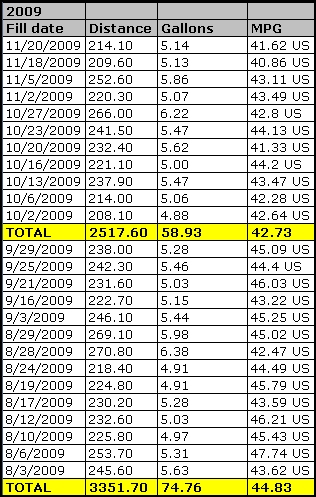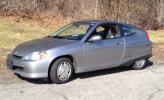 11-20-2009, 08:23 PM
11-20-2009, 08:23 PM
|
#1 (permalink)
|
|
Pokémoderator
Join Date: Dec 2007
Location: Southern California
Posts: 5,864
Thanks: 439
Thanked 532 Times in 358 Posts
|
MPG Decline from Colder Weather or Winter Blend Gas or ???
Hello -
From around the beginning of October, my fuel log tanks have been in the tank. One reason could be that I am refreshing some parts on the car in an attempt to improve my emissions (new 02 sensor, new EGR). I didn't reset the ECU/PCM to relearn because I wasn't sure if it was a good idea or a bad idea.
Now I am seeing my MPG on the decline. One reason is obviously the weather, but I wonder if the "winter gas" thing is effecting me. I was of the thought that I didn't get winter blends in Los Angeles, but now I think I do get the winter blend (probably because it's cheaper to make) :
What is summer-blend gas? - By Sam Schechner - Slate Magazine
Quote:
Summer-blend gas isn't new. It was first sold in 1995, as required by the Clean Air Act's 1990 amendments, and the current, even cleaner, concoction was phased in for the summer of 2000. Since then, there have been sharp spikes in fuel prices every spring as summer blends get rolled out. This is not so much because it's expensive to make the gas—the added cost per gallon is only 1 or 2 cents—but because refineries generally try to sell every last bit of winter fuel before mixing in the slightly more expensive summer batch. Sometimes they draw down the stock too far, creating shortages before the first deliveries of summer blend enter the supply chain. The return to normal blends in the fall causes a far less pronounced spike because the industry, free from summer standards, doesn't bother selling off the summer gas before mixing in the less pricey stuff.
So why not use the summer blend year-round? The main reason—apart from the fact that the 1990 law isn't written that way—is that summer-blend gas doesn't work as well in the winter. Summer blend's low-evaporation rate makes engines less likely to stall in hot weather but can make them difficult to start in the cold.
|
Anther forum talks about same subject :
Summer Gas Blend & Better MPGs - Maxima Forums
Quote:
|
- It is cheaper to make winter grade gasoline because it is possible to blend more butane into the fuel than you can in the summer, when you essentially can not use any Butane in gasoline. Butane is relatively cheap and has good octane properties. It also greatly helps an engine start when the temperature is 10 degrees below zero.
|
So, I guess I do get winter gas, but I am not sure *when* I get winter gas. I did a 2008/2009 comparison, where I looked at 2 month intervals before/after October 1st :


So, from the above, in 2008 I lost 0.81 MPG after October 1st. In 2009, over roughly the same time period, I lost 2.10 MPG. That's over 1 MPG different.
Maybe I will do a weather analysis to see if there is a big difference between 2008 and 2009. Also gotta look up what mods are there/not there from last year.
CarloSW2
|
|
|

|
 Today Today
|
|
|
|
 Other popular topics in this forum...
Other popular topics in this forum...
|
|
|
|
 11-21-2009, 01:01 PM
11-21-2009, 01:01 PM
|
#2 (permalink)
|
|
Master EcoModder
Join Date: Jan 2008
Location: Sanger,Texas,U.S.A.
Posts: 16,496
Thanks: 24,517
Thanked 7,436 Times in 4,817 Posts
|
winter losses
The SAE used to allow for up to a 3-mpg loss for winter operation.
Viscosities are higher at the lower ambient temps and even after 22-miles of continuous driving to reach equilibrium the viscosities are still higher than in summer.
It's a rough time for testing mods,as actual results may not be reflected until next spring.
|
|
|

|
|
The Following User Says Thank You to aerohead For This Useful Post:
|
|
 11-21-2009, 03:33 PM
11-21-2009, 03:33 PM
|
#3 (permalink)
|
|
Left Lane Ecodriver
Join Date: Aug 2008
Location: Buffalo, NY, USA
Posts: 2,257
Thanks: 79
Thanked 287 Times in 200 Posts
|
There's a well-written list of a dozen or so reasons your fuel economy drops when the weather gets colder, floating around the forum somewhere, but here's a quick list off the top of my head:
Winter gas has less energy per gallon. The viscosities Aerohead mentioned mean that every bearing and fluid in your car requires more energy to move. Cold air is denser and harder to push out of the way, increasing aerodynamic drag. Your ECU will run the engine richer and probably idle higher. The air in your tires has contracted and you'll have to add more to compensate.
The optimum fuel economy weather is: dry, and as hot as you can stand without using the A/C or opening the windows.
|
|
|

|
|
The Following User Says Thank You to RobertSmalls For This Useful Post:
|
|
 11-21-2009, 05:01 PM
11-21-2009, 05:01 PM
|
#4 (permalink)
|
|
Driving the TurboWeasel
Join Date: Mar 2009
Location: Steuben County, NY
Posts: 459
Thanks: 14
Thanked 18 Times in 17 Posts
|
Quote:
Originally Posted by RobertSmalls

The optimum fuel economy weather is: dry, and as hot as you can stand without using the A/C or opening the windows.
|
Ditto. My best FE ever came on a 100-degree day. I believe I downed 2 liters of water in 2 hours it was so hot in the car.
__________________
2012 Chevrolet Cruze Eco 6MT
|
|
|

|
|
The Following User Says Thank You to 99LeCouch For This Useful Post:
|
|
 11-23-2009, 12:30 PM
11-23-2009, 12:30 PM
|
#5 (permalink)
|
|
EcoModding Lurker
Join Date: Jul 2008
Location: US
Posts: 76
Thanks: 1
Thanked 15 Times in 6 Posts
|
Get a fuel warmer...
|
|
|

|
|
The Following User Says Thank You to tangomar For This Useful Post:
|
|
 11-23-2009, 01:12 PM
11-23-2009, 01:12 PM
|
#6 (permalink)
|
|
Master EcoModder
Join Date: Jun 2008
Location: Northwest Lower Michigan
Posts: 1,006
Thanks: 8
Thanked 17 Times in 16 Posts
|
1989 Chevrolet Celebrity CL 4 door Gas Mileage (Red Car) - EcoModder.com
My fuel log shows the same thing, a considerable drop right at the beginning of October. I can't say it's due to weather and temperature, since most of the summer was pretty horrible for weather and most of the fall we have have a lot of the nicest days of the year. It could very well be winter gas.
I do agree that my best mpg came from the handful of 70-80F days we had this summer. I even got 40 mpg going home from work 2 or 3 times.
__________________

Winter daily driver, parked most days right now

Summer daily driver
|
|
|

|
 11-23-2009, 02:49 PM
11-23-2009, 02:49 PM
|
#7 (permalink)
|
|
Pokémoderator
Join Date: Dec 2007
Location: Southern California
Posts: 5,864
Thanks: 439
Thanked 532 Times in 358 Posts
|
Hello -
Thanks for the tips. I think the weather has definitely been an important component. I went here ... :
California Data Exchange Center - Query Tools
... And looked for weather data for the same time period 2008 vs 2009. It was difficult because there are a lot of weather stations, but there is also a lot of missing data for this time period. I eventually had to settle for San Rafael Hills, which is North of downtown Los Angeles.
CSV Data Retriever: SAN RAFAEL HILLS (LOS ANGELES R)
I used the "TEMPERATURE, AIR AVERAGE (deg f)" data to build this graph (from August 1 to November 22, 2008/2009):

The keys are the thick flat monthly averages. October 2009 was about 7+ degrees colder than October 2008. This implies to me what I was hoping for. My October/November 2009 has been much colder on average than the same period in 2008.
This makes me happy because, hopefully, the emission-cleanup mods I have been doing were not the culprit.
CarloSW2
Last edited by cfg83; 03-12-2010 at 12:10 PM..
|
|
|

|
 11-23-2009, 10:15 PM
11-23-2009, 10:15 PM
|
#8 (permalink)
|
|
OCD Master EcoModder
Join Date: Dec 2007
Location: Eastern CT, USA
Posts: 1,936
Thanks: 431
Thanked 396 Times in 264 Posts
|
I think the reasons discussed are all true.
What to do about it?
My gas log seems to show I'm doing a few mpg better than this time last year. I credit two things:
1) I recently uncovered the upper block and got a good rise in intake air temperature. The upper grill slots are small but apparently the intake air flows through them and thru the radiator before getting sucked into the filter box.
2) Lower grill is the big one on my Civic and I've carefully blocked off most of it with chunks of foam pipe insulation wrapped in duct tape. With that done I've been able to run some cabin heat and still get good engine temps. I watch the coolant temp on ScanGauge and I don't generally open the heater valve till its fully warm. Warmup just takes so much longer if you start heating the cabin early.
__________________
Coast long and prosper.
Driving '00 Honda Insight, acquired Feb 2016.


|
|
|

|
 11-24-2009, 03:49 PM
11-24-2009, 03:49 PM
|
#9 (permalink)
|
|
Pokémoderator
Join Date: Dec 2007
Location: Southern California
Posts: 5,864
Thanks: 439
Thanked 532 Times in 358 Posts
|
brucepick -
Yeah, I am going to modify my grill block setup for my "LA winter". I think I will also work on an undertray ahead of the front wheels. My problem is that it is pretty easy to put the car in the overheat zone. When that happens, it costs me up to 30 Amps to run the electric fan.
I checked and found my PSI down on all my tires in the range of 42-45 (me lazy), so I upped it back to 50 today.
CarloSW2
|
|
|

|
 11-24-2009, 07:38 PM
11-24-2009, 07:38 PM
|
#10 (permalink)
|
|
Left Lane Ecodriver
Join Date: Aug 2008
Location: Buffalo, NY, USA
Posts: 2,257
Thanks: 79
Thanked 287 Times in 200 Posts
|
cfg83, is 30A the rating of the fuse/relay, or the actual power draw? If that's the actual power draw, it costs you the better part of a horsepower. That's a whole lot, but it's very low duty cycle, while the aerodynamic benefit of a better-blocked grille is continuous.
Winter is coming, and I'm thinking about stepping up my game with a block heater, and grid-charging of one or both batteries. Plugging in and colder weather seem to go hand-in-hand.
|
|
|

|
|
The Following User Says Thank You to RobertSmalls For This Useful Post:
|
|
|